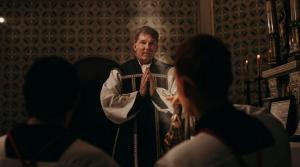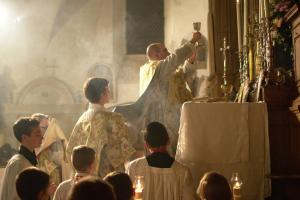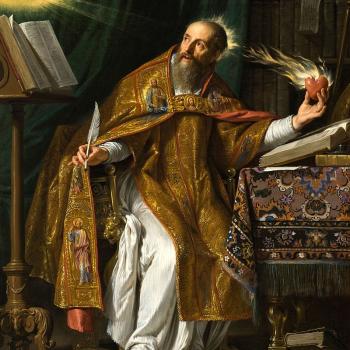A Broad Chorus of Catholic Thinkers
The diversity of thought within Catholic teaching, like variety within the strictures of sonnets, is one of its most beautiful features. It is nevertheless important to listen, as much as we can, to a broad chorus of Catholic thinkers. I have found great consolation in the fact that someone holier and smarter than myself has likely asked my questions already; my job is to find them and to listen, and then to make as many people as possible read block quotations about it.
Sharon Kabel , OSB vs. UFO: Stanley Jaki and the Theology of Aliens (June 16, 2021)- OnePeterFive
With that thought in mind, here are some Catholic Hot Takes of current serious issues given in bite sized block quotations.

Fr. James Alman
You can’t go anywhere on Catholic cyberspace without the issue of Fr. Altman coming up and how he is being aggressively repressed by the bishops for ‘Speaking The Truth‘.

To start out this section of hot takes I present to you what Deacon Greg Kandra posted on the subject which includes a link history of the dispute between Fr. Altman and his bishop. It is followed by a plea for prayer.
This has been a long time coming.
From last September: Bishop issues statement on ‘fraternal correction’ of Father James Altman
From May: Bishop asks Father Altman to resign; priest vows fight
And then this: Diocese of La Crosse statement on Father Altman
Stay tuned.
UPDATE: A priest posted this on Twitter tonight, and it bears repeating:
“Just a reminder: it is a tragedy for the entire Body of Christ when a priest puts himself into such a grave situation that his faculties are removed. This is not a time for gloating, finger pointing, or detraction. The Christian response is to love our brother and pray for him.”
Why do some people support Fr. Altman? I agree with some but not all of what is said in this video.
Let’s be clear: he’s not being suspended because of his personality. It’s because he has created a toxic environment of misinformation, disobedience, and division in the Church. Fr. Casey, OFM @caseyofm Replying to @Miserando1Woman accused St. Gerard Majella of misconduct. His bishop, St. Alphonsus Liguori forbade the Saint to RECEIVE HOLY COMMUNION! The Saint obeyed his superior. He continued to respect his bishop. The woman later confessed her malicious accusation. Obedience was key to the Saint!
I hate to say it but the entire Altman thing is a disgrace. He rose to viral fame through a slick, highly-produced video in which he took easy political pot shots that told his target audience exactly what they wanted to hear.It wasn’t rhetoric designed to persuade. It was rhetoric designed to reinforce people in their existing beliefs. It’s the Taylor Marshall school of content. Just keep feeding people what they want to hear. Play on their fears, throw rocks at their enemies, confirm their suspicions, and so on. It’s formulaic persuasion technique, and people eat it right up.And if the things he were saying were truly insightful, maybe it would still be OK. But they’re not. And he’s a big mouthed braggart who throws lots of insults at his imagined enemies. They’re all “leftist losers” or “godless vermin” or “pansies” or whatever else. It’s not masculinity, it’s machismo. They’re not the same.
The fact that Fr. Altman presents himself as a martyr and a prophet only bolsters my impression that it’s pride, not genuine concern for souls, that animates his 15 minutes of fame. Time will tell. Either way, we should not be so desperate for heroes, especially not political.
[edited] Quotes from Fr. Altmann: “The gloves are off…we’re coming for you Malloy and we’ll take your crosier.” This is a mob, not the communion of saints. This is why I don’t stand with Fr. Altmann. But I will kneel and pray for him: Lord Jesus, if it is your will and in your name, if there are spirits of rebellions and disobedience in your brother and priest Fr. Altmann, I ask you to bind them up and cast them out and loose in spirits of fidelity and obedience in the name of the Father and of the Son and of the Holy Spirit.[edit]: Can. 1373. A person who publicly incites among subjects animosities or hatred against the Apostolic See or an ordinary because of some act of power or ecclesiastical ministry or provokes subjects to disobey them is to be punished by an interdict or other just penalties.-Dr. Steven Smith
Fr. James Martin
What Martin seeks to do is make disciples of Jesus. But that happens by encountering persons and introducing them to Jesus, not by beginning, “You know what’s wrong with you? You’re the worst! Everything about you is the worst. You disgust Jesus! I shouldn’t even be talking to you, but I am because it’s my duty.” That is the overwhelming message of the Righteous, not just to gays, but to practically everybody.
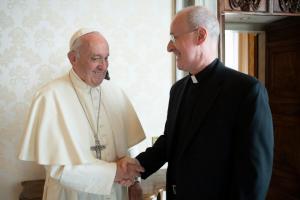
One common criticism of Fr. Martin’s ministry to LGBTQ Catholics, is that he creates “confusion” among his flock. In his writing and public speaking, he chooses not to lead with (or frequently bring up) the Church’s teachings on the morality of same-sex sexual activity. Instead, he focuses on how the Church can show compassion and openness to the LGBTQ community. This criticism has also been leveled against Pope Francis since the early days of his papacy, when comments like “Who am I to judge?” still received “explainers” in mainstream Catholic media. This criticism hasn’t gone away, for neither Martin nor Francis. In fact, the notion that they want to change Church doctrine on sexual morality has become the bedrock assumption animating the reactions of many conservative Catholics to both of them. Complaining of “confusion” about their pastoral approach seems to be another way of expressing disagreement with any Catholic response to LGBTQ issues that does not begin with the articulation of Catholic teaching on sexual morality.
The truth is that many Catholics are unwilling to accept Pope Francis’s pastoral method—and Martin’s. They think that not to give a full-throated defense of God’s design for human sexuality is a sign of weakness and doctrinal dissent. Pope Francis has frequently taught that this kind of rigorism hinders evangelization in our contemporary, polarized, post-Christian culture. Instead he has advocated an approach that begins with an invitation and seeks to “build bridges” to men and women today. This is how Francis says we can prepare fertile soil where the seed of faith can take root.-Pope Francis understands Fr. Martin—Do we? | Where Peter Is
“As far as “discussion on the morality of same-sex attraction,” I think straight people wildly underestimate how much of this stuff we’ve all already heard. Some people are down for discussing intensely personal experiences with strangers. (I’m doing it now!) But if I’m in the confessional, I do not need a lecture on Church teaching, which I already accept, or “identifying as gay,” which is not a sin. I can’t tell you how many times I’ve seen someone post a deeply personal, heartfelt discussion of the spiritual struggles they’ve experienced seeking to be faithful to Christ while growing in self-acceptance and unlearning self-hatred… only to have somebody pop up in the comments to inform them that being gay is a sin. The people who brought me into the Church shared their own faith with me, answered my questions, and did not lecture me about what Jesus thinks of my sexual orientation. That approach helped me trust not only these specific Catholics, but the Church as a teacher. In general, if you’re discussing the Catholic sexual ethic with a gay person (or anybody, probably), it’s good to ask yourself what you have done to make yourself trustworthy in this person’s eyes.Our obedience to Catholic morality is grounded in our trust that this is the Way Jesus teaches, and that He is Love incarnate. Why would we even care what the Church teaches if we didn’t trust that She can help us love? Restoring this trust, which has so often been damaged by Catholics’ misguided actions, is the first step in any attempt to provide moral guidance.” ‘Gay and Catholic’: A Q&A with writer and speaker Eve Tushnet (catholicnewsagency.com)
So people will call Father Martin heretic or a dissenter without appropriate evidence to back that up. But on the other hand, there are people who refuse to acknowledge the controversies and the problematic things that Father Martin says and the spiritually dangerous conclusions that they can lead people to. Even if Father Martin says I never intended for people to reach this conclusion from what I said, I only said this. That’s what I mean by a slippery tactic. And that Father Martin can say something where people will read it, whether it’s his critics or it’s people who are outright dissenters who want the church to ordain women, to have same-sex, quote unquote same-sex marriage who will read with Father Martin says and take from that the idea that maybe this is all okay or he thinks that it’s okay.
-Trent Horn Exposing Fr. Martin’s Slippery Tactics | Catholic Answers
For further commentary read The Spirituality of Fr. James Martin
Biden and Communion
First off in this section is an opinion I disagree with.50 y
But there is no moral heroism, and certainly not the taking of a self-described prophetic stance, in disciplining a faithful Catholic on the basis of a political position held by very many American Catholics. This is all the more so when the purported prophetic discipline curries the favor of a certain quarter of the Catholic donor class. One hopes that when the bishops finally vote on this matter at their November meeting, the desire for a false purity through discipline will yield to the Gospel’s message of grace and mercy, a message that can only be truly received by those with a deep sense for the shared sinfulness of the Church.-The New Donatism | Commonweal Magazine
The Following quotes explain why I disagree with the above position. First from Ignatius Press President Mark Brumley who has an opinion on this topic.
Bishops in the United States must decide whether they recognize that prominent public Catholic political support for 62 million abortions over the last ears and ongoing promotion of abortion today, including by the most prominent Catholic politician in the world, the president of the United States, constitutes manifest grave sin and a strong, scandalous counter-witness to the Gospel of Jesus. If so, then denial of the Eucharist is a sound pastoral last resort consistent with the political implications of eucharistic participation for followers of Jesus.
Otherwise, Catholics (and others) will conclude, not unreasonably, either that political advocacy for abortion is not really seriously wrong or that persistent public grave sin has no real consequences when it comes eucharistic participation, because eucharistic communion does not mean much when it comes to Catholic public life. Neither conclusion fits with an authentic Vatican II Catholicism. And surely neither conclusion is one bishops should want to encourage.
–Are some bishops ‘politicizing’ the Eucharist? Yes, in a perfectly sound, pastoral way. | America Magazine
And now Catholic Youtuber Brian Holdsworth
The debate about communion is simple: if you believe it should be available to all, then that’s your position, but it has never been the belief of the Church. The belief that it should be withheld from those who do not believe/practice the faith is not weaponizing it; it’s following scripture/tradition and it is done so in the interest of the individual from which it is being withheld. Scripture says that to receive communion unworthily is to eat and drink damnation (1 Corinthians 11:29). So to not govern its reception would be a major dereliction of duty on the part of the clergy. If you agree that it should be withheld in some instances but not in the case of politicians because that would “politicize the sacraments”, then you are arguing that politicians are a privileged class for whom the rules do not apply. I can’t imagine many people signing on to that.
–Brian HoldsworthJune 19 at 2:07 PM
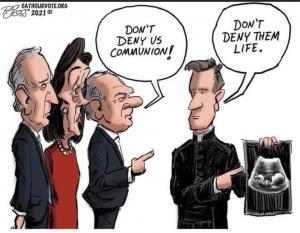
When anyone knows that they should not go to Communion, but still go, they commit a sacrilege. There must be some reason we are receiving when we shouldn’t. Generally, we want something like appearing as a better Catholic than we are, wanting to avoid awkwardness, out of fear others might think bad of us, or some such end we seek for ourselves: at least that’s what was going in my mind when I did so as a teenager and others have told me was going on in their mind when they received unworthily. This is a weaponization of the Eucharist for our own ends. This applies for any of us who has committed a mortal sin or a person who has created grave public scandal due their positions contrary to the Catholic faith and natural law.
The Eucharist is Jesus himself, so should never be used for other ends. In fact, the Catechism says He is “the source and summit of the Christian life.” (1324) Misusing a person as a means not an end is always bad, but more so when it is a divine person like Jesus Christ.
The Church has canon 916 that suggests such people, even if the issue is not public, abstain from the Eucharist. Canon 915 then instructs those whose actions present public grave scandal for the Church to be denied Communion if they choose not to follow 916 on their own.
Such misuse can be called “weaponizing” the Eucharist. It is using the Eucharist as tool to win in social or political situations
Let’s not weaponize the Eucharist. Let’s protect it from politicians and others presenting public scandal who want to weaponize it for their ends. The Eucharist is God and should be protected. Canons 915 and 916 are law, not suggestions.
-Fr. Matthew P. Schneider LC, Who is Weaponizing the Eucharist? Politicians, Not Bishops (patheos.com)
In the end it is not an easy issue.
Our Catholics, whether conservative liberal or middle-of-the-road, have been through a lot. I always say that being a Catholic in Boston is a contact sport. The secularization of our culture, the loss of a commonly held Christian anthropology, and now the fallout of the sex abuse crisis have left Catholics shaken in their faith, angry at the bishops and mistrustful of leadership in the Church.
The controversy about the denying of Communion to politicians fuels anger on both sides. If we bishops get caught up in this fight, we can easily give the impression that we are divided in our opposition to abortion, and I do not believe that.
We need to show a united stance on behalf of the Gospel of life and all of its ramifications. If we are divided, we will be weakening the Church, and our ability to promote the Gospel of Life will be compromised. Denial of Communion to politicians will be interpreted by most Americans and Catholics as partisan politics that has nothing to do with reverence or piety.-The Pro-Life Vision of Cardinal Sean O’Malley | Mark Wilson (patheos.com)
Still Biden’s stance on abortion is troubling.
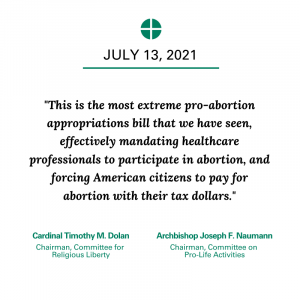
Dare We Hope
“Gregory of Nyssa, in contrast, tries to advance philosophical and theological arguments to prove that the pains of hell cannot be co-eternal with God. His main argument is based on the essential superiority of good over evil; for evil, in its essence, can never be absolute and unlimited. The sinner inevitably reaches a limit when all his evil is done and he cannot go farther, just as the night, after having reached its peak, turns toward the day. This reasoning corresponds to the example of a physician who allows a boil to mature until it can be lanced. Thus the Incarnation, too, occurred only when evil had reached its climax. Gregory’s position has never been condemned.”
― Hans Urs von Balthasar, Dare We Hope That All Men Be Saved?: With a Short Discourse on Hell – 2nd Edition
Larry Chapp has written a theological defense of Hans Urs von Balthasar’s ‘Dare We Hope’ thesis. In his latest blog post he responses to a criticism of his post by another popular Catholic spiritual writer. Here are a few highlights from that writing that I found particularly good and compelling. This section usually isn’t this long, but I feel that this is an important issue. First off Larry tells us about his writing style.
I do indeed write with a certain pugnacious bravado since I think a blog should be, among other things, a bit humorous even while making substantive theological points. And, as I have stated before, what is to one person “inflammatory rhetoric” is to another person “spot-on satire.” The response almost always depends upon one’s antecedent views of the target of the satire. Therefore, I make no apologies for writing as I do and will continue to do so.
Larry describes the issue at hand.
The Church teaches that we cannot know if any particular person is in Hell, and the Church allows us to hope for the salvation of all so long as we do not assert it as a dogmatic certitude (universalism as such). Therefore, it is hard to see how it is theologically justified to condemn theologians who teach that such a hope is real as having fallen prey to a demonic lie.
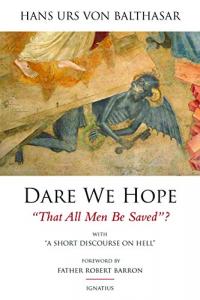
Larry goes on to critique the narrow theological ideology and absurd idea…
that people won’t pursue the moral good with any real salvific fervor unless they are threatened with eternal punishments. And it is an idea which is not only silly but runs afoul of the Thomistic notion that we are all constitutively oriented to the Good. I personally have known atheists, agnostics, indifferentists, Hindus and Buddhists (who have no notion of an eternal Hell), and Christian universalists, who all led lives of moral uprightness. Indeed, even C.S. Lewis, in his great book, “The Abolition of Man,” notes the universality of the moral law etched in the hearts of every human being and which is ensconced in every major world religion. He also uses this universal moral “instinct” at the beginning of Mere Christianity as the linchpin of his argument for God’s existence.
The traditionalist movement seems determined to return to some version of the doctrine of the massa damnata and, therefore, this is why they loathe Barron and Balthasar. They don’t care whether those two thinkers are orthodox and profound. They don’t care if they both have had an impact on the Church that is overwhelmingly positive. And most of them have never read either one to any great extent. All they know is one thing: Barron and Balthasar hope that all are saved and view such a hope as a real one. And that is a bridge too far apparently. It is shocking to see the depths to which they will descend in order to excoriate both thinkers simply because they dare to hope for what it is God says he wants, and the Church asks us to pray for. Oh the horror! – Larry Chapp,My Response to Dr. Ralph Martin’s Response – Gaudium et Spes 22
When I read things such as the defense of residential schools in Canada or see how Fr. Altman is being compared to St. Joan of Arc for his brave stance of shouting angry insults at the right ideological enemies of the rad trads, I think how much people get turned off by Christianity because of bad witness. I believe that God has taken our stupidity and lack of faith into consideration and will take the necessary steps to correct our bad witness and give people the necessary grace to save souls turned off by our lack of love of others. That is my hope and I’m allowed to think this.
Here are some further thoughts that might be helpful. Especially this quote on the narrow way.
Jesus says the way to hell is broad and many find it and that the way to heaven is narrow and few find it. And he means it: you don’t get to heaven simply by being born, by being nice, or by oozing into an eternal growth experience. But “few” here does not mean that less than half of mankind will be saved. For God speaks as our Father, not our statistician. Even one child lost is too many, and the rest saved are too few. The good shepherd who left his ninety-nine sheep safe at home to rescue his one lost sheep found even 99 percent salvation too “few”. – Peter Kreeft Hell (Feb 28 2018) Crossroads Initiative
Dr. Kreeft never disappoints. Cardinal Dulles elaborates on this topic.
The search for numbers in the demography of hell is futile. God in His wisdom has seen fit not to disclose any statistics All told, it is good that God has left us without exact information. If we knew that virtually everybody would be damned, we would be tempted to despair. If we knew that all, or nearly all, are saved, we might become presumptuous. If we knew that some fixed percent, say fifty, would be saved, we would be caught in an unholy rivalry. We would rejoice in every sign that others were among the lost, since our own chances of election would thereby be increased. Such a competitive spirit would hardly be compatible with the gospel.
We are forbidden to seek our own salvation in a selfish and egotistical way. We are keepers of our brothers and sisters. The more we work for their salvation, the more of God’s favor we can expect for ourselves. Those of us who believe and make use of the means that God has provided for the forgiveness of sins and the reform of life have no reason to fear. We can be sure that Christ, who died on the Cross for us, will not fail to give us the grace we need. We know that in all things God works for the good of those who love Him, and that if we persevere in that love, nothing whatever can separate us from Christ (cf. Romans 8:28-39). That is all the assurance we can have, and it should be enough.
Avery Cardinal Dulles, S.J. The Population of Hell (May 2003) First Things
I needed to include Jimmy Akin somehow in this article, so here he is on an important question answered charitably, intelligently, and Catholic.
“Dare We Hope?” FAQ page – Word on Fire
Freeing the Latin Mass
David Mills has some thoughts about getting rid of the toxic culture of Rad Trads by allowing greater access to the Latin Mass.
Writing about my article on the Latin Mass, a friend pointed out that Benedict insisted that the churches that adopted the Extraordinary Form not oppose the Second Vatican Council and the Ordinary Form. But if you want hateful opinions about both, you’ll find them in EF parishes. They were also the ones who most bitterly opposed the government and church’s attempt to respond to the pandemic.It’s something I’ve thought about, because my own encounters with traditionalists have been very mixed. My friend identified the practical problem with letting more parishes celebrate the EF, because in many cases their feelings for the Latin Mass are confused with their traditionalism, which is mixed with a resentful, alienated rightwing politics. Many seem to favor the latter most and get to the first that way, while some begin with the first and add the others.
But some of that alienation is the fruit of the Church’s cruel closing down of the Latin Mass and its continued suppression. The whole thing began with a trauma imposed on faithful Catholics by the people their belief taught them to trust. Even people who never knew the Latin Mass as the sole rite may inherit the memory of the first and experience the second.In other words: If you don’t want traditionalists, don’t trash the tradition.My guess is that really freeing the Latin Mass would both strengthen some rightwing communities by giving them more places to gather, but also dilute them by giving them more places to gather. It might create new communities of cranks but also spread out some cranks into healthier communities. And it might let the people who just love the old Mass to have a leavening effect on the whole movement.LATER: By mixed experiences, I meant from warm friendships with people who love the tradition and wanted to share what they loved, to people who hated me for not being their kind of near-schismatic, but who despite hating me wanted to convert me, or at least lecture me.-David Mills
Residential Schools
Recently some churches in Canada have been set afire by arsonists.
Over the past fortnight, some dozen churches in Canada, many serving indigenous people, were torched. A dozen more, most in non-indigenous contexts, were vandalized. “Burn it all down,” tweeted the director of the British Columbia Civil Liberties Association, to supportive cheers. The chaos ensued after discovery of the remains of hundreds of indigenous youths, buried near the residential schools in which they were enrolled under a policy backed by the Indian Act of 1876. Amendments to this act in 1894 and 1920 made attendance at residential or industrial schools compulsory for those who lacked access to day schools. The last of the former, many of which were operated by the Catholic Church, closed its doors in 1996. Over more than a century, about 140,000 children passed through these schools. Upward of four thousand—perhaps as many as ten thousand—passed away while attending them or expired soon afterward.
How could this be? Who is responsible? Are the religious organizations who operated the residential schools the real culprits, as many suppose? A careful examination shows that supposition to be flawed. The tragedy, and the crimes it involved—crimes some are falsely characterizing as genocide—began with government-mandated violation of parental rights, an error gaining currency again today. The History of Canada’s Residential Schools | Douglas Farrow | First Things
Recently someone come out with an article saying the atrocities at the residential schools where lots of children were found in unmarked graves, was an overall good thing. Some Christians responded.
There is nothing about spreading the gospel that requires the horrors of the residential schools. Nothing. And kidnapping and genocide are not the only means of sharing the gospel. It’s the same kind of argument that says African Americans should be grateful for slavery because at least it exposed them to Christianity (there was, of course, already a rich Christian tradition in Africa, but that’s for a different article).
Can the gospel require great sacrifice on the part of those who receive it? For sure. I think of my fellow Christians persecuted in many parts of the world right now. But the sacrifices aren’t supposed to be imposed by the ones bringing the gospel. I cannot fathom a Jesus who looks at children’s bruised and broken bodies, bleeding private parts, and traumatized minds, then shrugs his shoulders with impatience and says, “Hey, you got in, didn’t you?”
Leary’s article is not a “Christian” perspective on anything. It is the arguments of an angry conservative hell bent on not losing another round in the culture war — who, yes, happens to believe in a Jesus. Maybe even my Jesus. I can’t tell.
Telegrams: A “Christian” Defense of the Indian Residential Schools? Yeah, no thanks … (johnrgram.blogspot.com)
And then there is this commentary on the topic.
I can’t believe I have to write this but… no, the Native graves weren’t good. They were a crime against the cross. They were mortal sin. The children were precious in the eyes of God—even when forgotten, abused, and neglected by the Church. It’s damningly ironic for a conservative organization like the American Conservative that cares so much about anti-abortion policy to publish something so indifferent to the lives of children taken too soon by someone else’s hands.
The Second Vatican Council’s Dignitatis Humanae likewise reads, “The search for truth, however, must be carried out in a manner that is appropriate to the dignity of the human person and his social nature.” The same magisterial document later adds, “Consequently, to establish and strengthen peaceful relations and harmony in the human race, religious freedom must be given effective constitutional protection everywhere and that highest of man’s rights and duties—to lead a religious life with freedom in society—must be respected.” If it’s a Christian responsibility to protect and allow other religions to thrive, the paganism of the Indigenous must be included. The “suffocation of a noble pagan culture” in exchange for the genetic descendants to be “received into the Church of Christ,” contrary to the American Conservative, would not be “worth it” since such religious and cultural suffocation denies others the freedom of religion that they are entitled to according to the teachings of the Church.
St. Maria Goretti
There is some controversy with the feast day of St. Maria Goretti.
Apologetics Pro Tip of the Day: The only factor of a canonization that is an infallible proclamation of the Church is that **the deceased is in heaven.** There is no guarantee that the REASONS someone was canonized were infallible. Even if someone was canonized for problematic reasons, we can at least be certain that person is in heaven.
I don’t care what Pius XII said about St. Maria Goretti during his canonization homily. In that instance, he was acting infallibly only insofar as he enrolled her into the canon of saints. The chatter about how rape would have “destroyed her childlike purity” and that Maria “gave her life to protect her virginity” is pious nonsense. Quite frankly, it was also unworthy of a man who should have known that the Church has taught as far back as St. Augustine that sexual assault doesn’t affect a person’s virginity.
–Michelle ArnoldJuly 6 at 3:20 PM
Why is the first thing that happens when you’re raped, that people refuse to believe you and rush in to tell you what actually happened?
Why are they desperate to find a reason why it wasn’t rape?
Why have we as a culture spent so much time glorifying the virtue of people who fight the rapist off, even if it costs them their lives, and assuming that rape victims did something to merit it?
And then it hit me: is this why people insist that Maria Goretti’s sanctity wasn’t in enduring suffering patiently and forgiving her abuser, but in the fact that she was so virtuous, she managed to die without being penetrated? Her skin penetrated with an awl, yes, but not another part penetrated with anything else? Impossible. She was a good girl. Such a good girl that she protected herself from the ultimate dishonor, at the cost of her life. Is that whole line of thought a form of denial?
Is this why victims of sexual violence are told over and over again that they must have been asking for it or it never would have happened? Or if they clearly weren’t asking for it, that it wasn’t so bad or that they made it up for attention? -Mary Pezzulo On The Feast of the Intact (patheos.com)
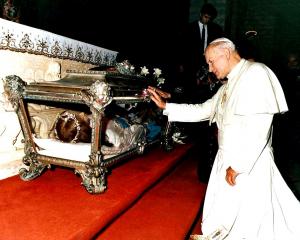
Wow. And now some more insightful commentary from the wonderful Deacon Steven Greydanus.
It is possible both to admire and venerate Maria Goretti and also to recognize the limitations and failings of her cultural milieu and their tragic effects in her brief life.
To turn a blind eye to those limitations and failings — to elevate her traditional Catholic cultural world above reproach — goes hand in hand with refusing to acknowledge the blind spots in our own religious milieu. Once we ask what Maria’s culture or upbringing may have failed to impart to her, we may have to ask, “What might our own children not have learned from us?”
Many prefer to focus on the evils of external enemies — the sexual revolution, secularism, pornography, gender ideology, etc. — rather than engage in honest self-criticism. Asking what we may have to learn or how we may have to grow can be difficult; how much easier and more comforting to assume that, since we have the true faith, any criticism of what we think or how we live is criticism of the truth. Ultimately, in the words of Thomas Merton, “what we pretend to be defending as the ‘truth’ is really our own self-esteem.” –Maria Goretti’s silence was tragic, not heroic, and not a model for us – Catholic Herald
Internet Discourse
To end this discussion, here are some helpful reminders for good discussions. You don’t have to be nasty and overturn tables, slap heretics and chop down pagan trees when dealing with others.
Everyone wants to imitate Jesus in the one time He showed some temper with the whip in the temple. Dude, you are not Jesus. It’s a much safer bet to imitate Him in the other 99% of the Gospels, like when He preached the good news, when He fed His sheep, when he gave over His body, and when He fixed His eyes firmly on the Father and then told us to do the same.
Simcha Fisher, The only thing I will write about the Amazon Synod (October 21, 2019)
The amount of time Jesus went about being angry is rather small compared to everything else he did.
Matthew 23 deals with Jesus being nasty to the leaders of the pharisees. If Jesus can do it, I can do it as well, right? This is one chapter. We have to take it into account but it’s one chapter. The four gospels contain a total of 89 chapters and in one of them, Jesus is exceptionally harsh. In the other ones, He is mild, calm, articulate, firm, and even mildly angry. Still, 1 out of 89 is 1.1% of the time. Taking the words of 1.1% percent of the gospels and applying them to 80% of your behavior is not following Christ, it’s an excuse to act how you want, when you want.
The same case could be made with St. Paul. He has one chapter that’s extremely harsh and in the other chapters, there is a range of ways that he articulates his message.
Here are a number of saints who are known for their harshness and even nastiness. We must remember that saints, being holy men and women are still flawed. No saint is perfect.
St. Thomas More argued against Luther, Tyndale, and other Protestants quite viciously. It’s almost painful to read at times. St. Francis de Sales was the exact opposite. He was gentle, mild mannered, but firm and spoke the truth when he needed it.
-Allan Ruhl Nasty Internet Stuff(October 9, 2019)www.allanruhl.com
We don’t want to become a disciple of Christ who is always complaining about the state of the world and bring that into our writings, videos, and social media output.
In Conclusion
As important as it is to have Hot Takes and talk about serious issues. Sometimes in Catholic life we need some Catholic content like this.
And This.


